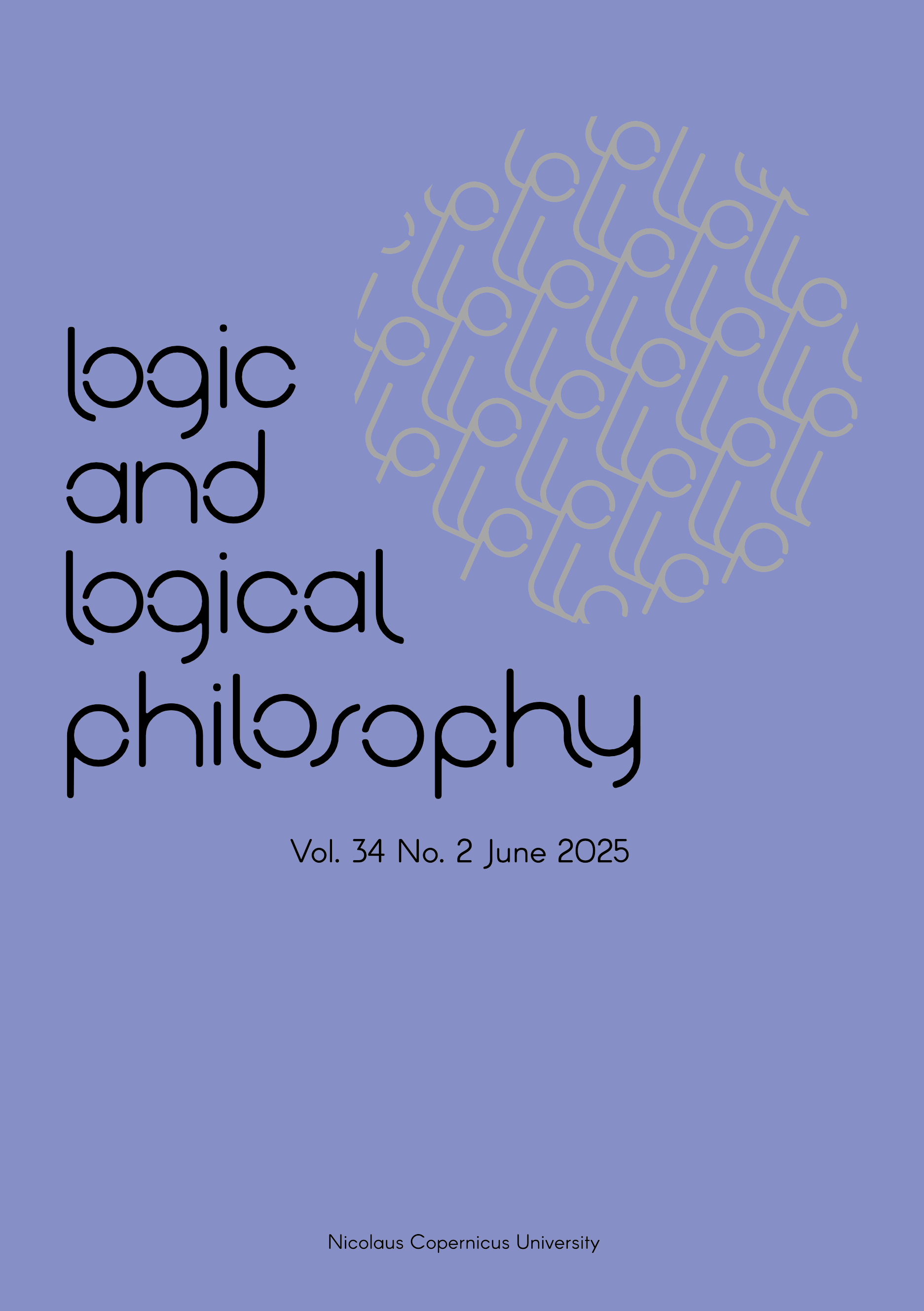Presuppositions and the Content Implication
DOI:
https://doi.org/10.12775/LLP.2024.030Słowa kluczowe
non-Fregean logic, truth-functional logic, content implication, presupposition, semantic correlates, logic of conAbstrakt
In the 1950s Peter Strawson analyzed the works of Bertrand Russell regarding fundamental definitions of meaning, sentences and truth value. The debate between them uncovered many issues that Fregean, truth-functional logics have when defining concepts from natural language. To reconcile the Fregean paradigm with the reality of language use, Strawson proposed the concept of presuppositions necessary preconditions for the truth of other sentences. We believe that his proposition stemmed primarily from the problem caused by the fact that Fregean, truth-functional logics are not sensitive to the contents of sentences and reduce them to their logical values. This is bound to produce a mismatch between the way logic models reasoning and the way language users reason since real-life reasoning is performed on the contents of sentences and not their logical values. Inspired by the ideas of Strawson and Roman Suszko, who initiated the paradigm of non-Fregean logics, we propose a new solution to the debate between Strawson and Russell. In our solution, the content implication connective is used to express content relations between sentences. We move away from truth and falsehood as the sole two semantic correlates of sentences and instead work in a system where the contents of sentences are their semantic correlates.
Bibliografia
Bach, K., 1987, Thought and reference, Oxford: Clarendon Press.
Beaver, D. I., and B. Geurts, 2011, “Presuppositions”, Stanford Encyclopedia of Philosophy (access: 05.08.2020). https://plato.stanford.edu/entries/presupposition/
Bloom, S. L., and R. Suszko, 1972, “Investigations into the sentential calculus with identity”, Notre Dame Journal of Formal Logic 13(3): 289–308. DOI: https://doi.org/10.1305/ndjfl/1093890617
Brennan, J., 2016, “Naturalistic sentence comprehension in the brain”, Language and Linguistics Compass 10(7): 299–313. DOI: https://doi.org/10.1111/lnc3.12198
Czelakowski, J., 2019, “Abstract algebraic logic as a bridge between algebra and logic” [in Polish], Wiadomości Matematyczne 52(2): 201–217. DOI: https://doi.org/10.14708/wm.v52i2.3295
Davies, M., 1981, Meaning, Quantification, Necessity: Themes in Philosophical Logic, Routledge. DOI: https://doi.org/10.4324/9780367853952
Evans, J., 1982, The Varieties of Reference, Oxford: Clarendon Press. DOI: https://doi.org/10.2307/2219077
Frege, G., 1948, “Sense and reference”, tr. T. Geach, with Introductory note by M. Black, The Philosophical Review 57(3): 207–230. DOI: https://doi.org/10.2307/2181485
Frege, G., 1956, “The thought: A logical inquiry”, Mind, New Series 65(259): 289–311. DOI: https://doi.org/10.1093/mind/65.1.289
Grzegorczyk, A., 2011, “Filozofia logiki i formalna logika niesymplifikacyjna” [Philosophy of logic and perceptive equivalence], Zagadnienia Naukoznawstwa 4(190): 445–450.
Horn, L. R., 2001, A Natural History of Negation, CSLI Publications.
Johnson-Laird, P. N., 2010, “Mental models and human reasoning”, Proceedings of the National Academy of Sciences 107(43), 18243–18250. DOI: https://doi.org/10.1073/pnas.1012933107
Kuhn, T. S., 1962, The Structure of Scientific Revolutions, University of Chicago Press: Chicago.
Neale, S., 1990, Descriptions, Cambridge, Mass.: MIT Press.
Leśniewski, S., 1916, “Podstawy ogólnej teorii mnogości I” [Foundations of the General Set Theory I] Prace Polskiego Koła Naukowego w Moskwie. Sekcya matematyczno-przyrodnicza (2).
Łukowski P., 1997, “An approach to the liar paradox. New aspects in non-classical logics and their Kripke semantics”, RIMS Kôkyûroku 1010: 68–80.
Łukowski, P., 2011, Paradoxes, Dordrecht–Heidelberg–London–New York: Springer.
Łukowski, P., 2019, “A ‘distributive’ or a ‘collective’ approach to sentences?”, Logic and Logical Philosophy 28(2): 331–354. DOI: https://doi.org/10.12775/LLP.2019.011
Łukowski, P., 2020, “Content implication and Yablo’s sequence of sentences”, Logic and Logical Philosophy 29(1): 57–69. DOI: https://doi.org/10.12775/LLP.2019.012
Łukowski, P., 2022, “Propozycja formalizacji myślenia codziennego”, in D. Leszczyńska-Jasion, S. Chlebowski, A. Tomczyk and A. Zakosztowicz (eds.), Język – Struktura – Ontologia. Tom dedykowany pamięci Romana Suszki, Wydawnictwo Nauk Społecznych i Humanistycznych Uniwersytet im. Adama Mickiewicza w Poznaniu.
Mates, B., (1961), Stoic Logic, Berkeley, University of California Press.
Rabovsky, M., and K. McRae, 2014, “Simulating the N400 ERP component as semantic network error: Insights from a feature-based connectionist attractor model of word meaning”, Cognition 132(1): 68–89. DOI: https://doi.org/10.1016/j.cognition.2014.03.010
Ramachandran, M., 2008, “Descriptions and presuppositions: Strawson vs. Russell”, Suid-Afrikaanse Tydskrif vir Wysbegeerte 27(3): 64–79. DOI: https://doi.org/10.4314/sajpem.v27i3.31515
Reimer, M., and A. Bezuidenhout (eds.), 2004, Descriptions and Beyond, Oxford: Clarendon Press.
Rudnicki, K., and P. Łukowski, 2021, “Psychophysiological approach to the liar paradox: Jean Buridan’s virtual entailment principle put to the test”, Synthese 198(22): 5573–5592. DOI: https://doi.org/10.1007/s11229-019-02107-x
Russell, B., 1905, “On denoting”, Mind, New Series 14(56): 479–493.
Russell, B., 1957, “Mr. Strawson on referring”, Mind 66(263): 385–389. DOI: https://doi.org/10.1093/mind/lxvi.263.385
Sainsbury, R. M., 1979, Russell, London: Routledge and Kegan Paul.
Strawson, P. F., 1950, “On referring”, Mind, New Series 59(235): 320–344.
Strawson, P. F., 1952, Introduction to Logical Theory, Oxford.
Strawson, P. F., 1964, “Intention and convention in speech acts”, The Philosophical Review 73(4): 439–460. DOI: "https://doi.org/10.2307/2183301
Suszko, R., 1975, “Abolition of the Fregean axiom”, Lecture Notes in Mathematics 453: 169–239. DOI: https://doi.org/10.1007/BFb0064874
Wittgenstein, L., 1921, Tractatus Logico-Philosphicus, Annalen der Naturphilosophie.
Pobrania
Opublikowane
Jak cytować
Numer
Dział
Licencja
Prawa autorskie (c) 2024 Piotr Łukowski, Adam Olszewski, Konrad Rudnicki

Utwór dostępny jest na licencji Creative Commons Uznanie autorstwa – Bez utworów zależnych 4.0 Międzynarodowe.
Statystyki
Liczba wyświetleń i pobrań: 881
Liczba cytowań: 0







